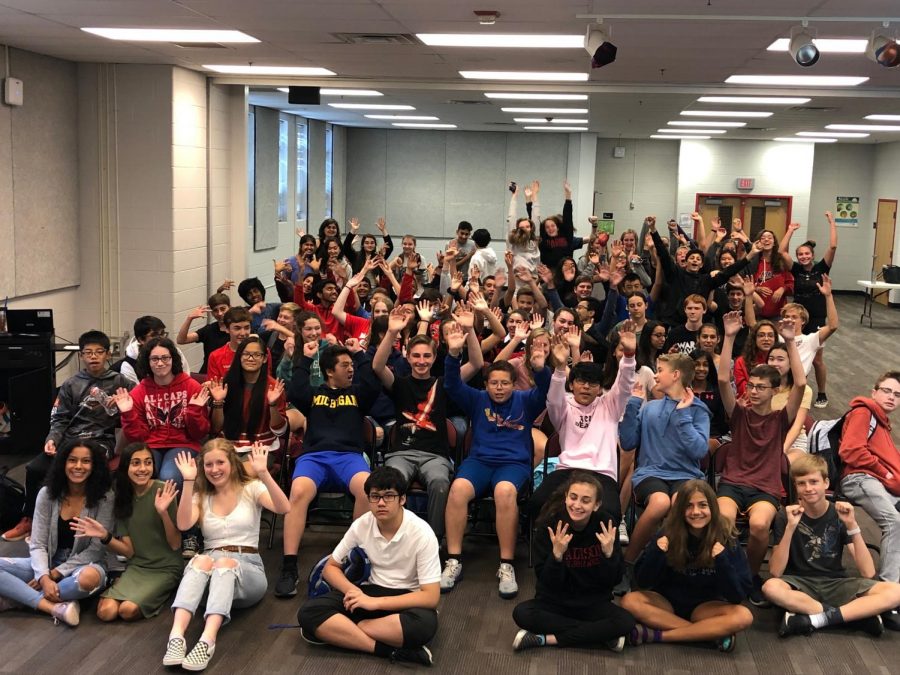Cross-Curricular Program Piloted with Freshman Students
Featured in The Hawk Talk’s October print edition
December 6, 2019
This past summer, three Madison teachers designed a brand new curriculum for a program that would approach teaching and learning in a new and non-traditional style in order to better equip their freshmen students with skills they could use beyond their high school careers. This program is called the Cross-Curricular Cohort.
The pilot program contains 90 freshman students who were selected because they all happened to be placed in classes with the teachers who designed the program; each had English 9 Honors with Emily Brown, Biology Honors with Monica Kimbrell and World History 1 with Marissa Petty.
The Cross-Curricular Cohort aims not only to teach students content required by the Virginia Standards of Learning but also to provide them with foundational skills that will enable them to succeed in all of their high school classes and in their future.
“The Cross-Curricular Cohort was created to empower our students with the skills and knowledge needed for our course and well beyond,” the Cohort teachers said. “We are so excited to try something new. Our world is changing, and we hope to continue growing with that change to support students in practical ways when they leave the building.”
The freshmen were informed of their placement in the Cross-Curricular Cohort on Aug. 27, the first black day of school. The Cohort teachers met with all 90 students in Warhawk Hall to explain the premise and day-to-day implementation of the program.
Many students were immediately intrigued by the program and thrilled to be the first class to embark on the Cohort.
“I was actually pretty excited [about being a part of the Cohort] because my sister had told me that all of the teachers were really good, so I was really excited to try it out,” Katherine Oskuie (’23) said. “And I was curious to figure out how it was going to go.”
Others were initially more doubtful but came to appreciate the program.
“When I found out I was in the Cohort, at first I was very skeptical,” Alinah Sheikh (’23) said. “I was thinking, ‘How can I get all the information for the SOL in this program?’ Later, when the teachers explained it more, I started to understand, and I really enjoy it now.”
Students in the Cohort suggested that their initial uncertainty about the program stemmed from the number of differences between the Cohort and traditional curricula.
One unique aspect of the Cohort is a more flexible schedule for students. The students in the Cohort have the three cross-curricular subjects on black days during second, fourth, and sixth period. Students go to English, biology, and history classes, but on some days, the order of the subjects is switched to allow more communication between students and teachers which, in turn, helps students to better learn content and skills.
“[The schedule] allows us access to the same group of students for an extended time, leaving room for more in-depth, hands-on interdisciplinary experiences,” the Cohort teachers said.
Another difference between the Cross-Curricular Cohort and the conventional freshman curriculum is that students in the Cohort aren’t assessed with traditional exams or tests.
“Our goal is to help students master essential skills in each of our content areas through authentic assessments such as writing assignments and class projects that will allow students to really show off their learning in ways that we couldn’t see with a multiple choice test,” the Cohort teachers said.
The Cohort curriculum is also unique because it teaches students creative and critical thinking skills, including research, observation, argumentation and reflection, across classes. For example, students typically learn argumentation skills specifically for English, specifically for biology, and specifically for history. In contrast, the Cohort curriculum aims to teach students skills for argumentation that can be used across every subject and eventually in the world beyond when students leave Madison.
During their second period block, also known as Innovation Time, teachers check in with their students and students work on their Passion Projects, plans in which students select a topic that they are passionate about. These projects are eventually implemented around the community.
“I love my Passion Project,” Sheikh said. “I am partnering up with two friends, and we are making a website that shows healthy desserts that people can make. We are reviewing desserts as well. [Our project] is to help obesity in the community. So we take a passion (baking), and then we take a problem (growing obesity rates) and we try to find a solution to that. I think it is so cool that we get to do something for a bigger purpose!”
Despite the Cohort’s unconventional take on the freshman curriculum, students and teachers are excited for what it has to offer to Madison. The Cohort teachers are embracing this new style of learning as the program takes action in its first year and hope to possibly expand the Cohort to other areas of the school in future years.
“Our goal is to create a similar program for students at other grade levels but our focus right now is on making this year the best we can,” the Cohort teachers said. “We will continue to seek feedback from students, parents and staff in order to reflect and improve so we can look to expand in the future.”



